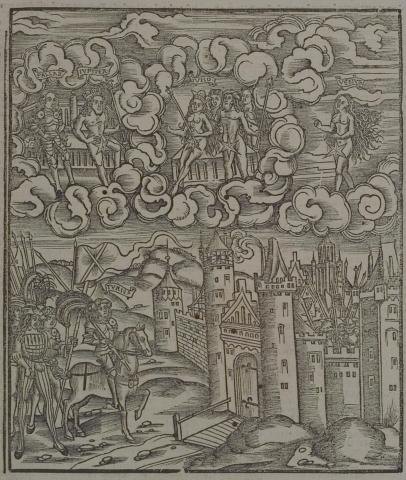Annotations
In Olympus, an etherial space in the sky, seemingly made of clouds, Jupiter calls together an assembly of the gods (1-5). He calls on the gods to explain to him why the Latins and Trojans are fighting without his permission (6-15). Venus points to Juno, blaming her indirectly in a long speech for the events leading up to the battle (18-62). Juno, in turn, denies that any of the events leading up to the battle are in any way her fault and claiming that anything she did to help the Rutulians is justified (62-95). Jupiter, choosing not to side with either goddess, declares that he will let fate decide the outcome of this war (100-15). In the lower half of the image, below the gods, Turnus and the Rutulians try once again to attack the Trojans, who are locked safe within their walls (118-45).
Woodcut illustration from the “Strasbourg Vergil,” edited by Sebastian Brant: Publii Virgilii Maronis Opera cum quinque vulgatis commentariis expolitissimisque figuris atque imaginibus nuper per Sebastianum Brant superadditis (Strasbourg: Johannis Grieninger, 1502), fol. 348r, executed by an anonymous engraver under the direction of Brant.


Sebastian Brant (1458-1521) was a humanist scholar of many competencies. Trained in classics and law at the University of Basel, Brant later lectured in jurisprudence there and practiced law in his native city of Strasbourg. While his satirical poem Das Narrenschiff won him considerable standing as a writer, his role in the transmission of Virgil to the Renaissance was at least as important. In 1502 he and Strasbourg printer Johannes Grüninger produced a major edition of Virgil’s works, along with Donatus’ Life and the commentaries of Servius, Landino, and Calderini, with more than two hundred woodcut illustrations. (Annabel Patterson)